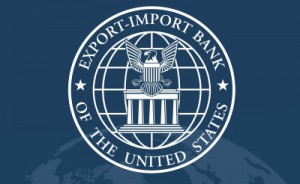by Bill Armbruster, blog anchor of Datamyne Blog
Financing is often the most crucial issue for US exporters, even more than the price of their goods. If commercial banks won’t provide the necessary credit, or the foreign buyers require assistance with financing so they can pay for the imported goods, or the exporter needs working capital so it can pay for the cost of producing the goods, financing can make or break the deal.
This is where the US Export-Import Bank can step in and provide the help that exporters, especially small businesses, need in order to compete with sellers in other countries. In fiscal 2013, the bank authorized $27.8 billion in export financing support, with almost 90% of the authorizations supporting small businesses.
One such beneficiary is Love and Quiches Gourmet of Freeport, N.Y., this year’s winner of Ex-Im’s small business exporter of the year award.
When Love and Quiches applied for export financing, Ex-Im’s small business export credit insurance provided the reassurance needed for Wells Fargo Bank to advance funds against the company’s foreign receivables and improve its cash flow.
With Ex-Im’s assistance, Love and Quiches increased its exports from $4.9 million in 2012 to $7.2 million in 2013. The company is targeting a 10% increase in exports this year. Susan Axelrod, the company’s founder and chairwoman, describes Ex-Im’s role in her book “With Love and Quiches: A Long Island Housewife’s Surprising Journey From Kitchen to Boardroom.”
You don’t have to contact Ex-Im’s Washington headquarters or one of its regional offices to obtain assistance; you can also go to one of the dozens of commercial banks around the country with delegated lending authority. These are listed on Ex-Im’s web site, including the name and phone number of the contact person.
The US Ex-Im Bank does not compete with commercial lenders; rather, it supports financing that banks would not provide on their own. Moreover, rather than being a drain on the federal budget, Ex-Im generates profits for the government through fees and interest payments on loans. Last year it sent $1 billion back to the federal treasury.
Ex-Im provides four principal types of support: working capital; export credit insurance; loan guarantees; and direct loans.
- The working capital guarantees help cover costs such as obtaining raw materials or components to make the goods, paying the workers and factory utility costs, such as lighting bills. The guarantees encourage commercial lenders to make working capital loans by providing them with a 90% loan backing guarantee, which decreases their risk. The exporters repay the loans after they receive payment from the foreign buyers.
- Export credit insurance helps companies increase their sales by limiting international risk against non-payment by foreign buyers due to commercial risks such as bankruptcy or political risks such as war or non-convertibility of currency. These insurance policies allow companies to provide qualifying international buyers with advantageous terms of credit, which is especially critical for those who demand open-account transactions. It’s available for both short and medium terms.
- Loan guarantees are available for medium-term and long-term transactions, with Ex-Im providing an 85% guarantee to creditworthy international buyers in both the private and public sector. They are generally available for up to 10 years.
- Direct loans, a small component of Ex-Im’s overall portfolio, provide fixed-rate financing – up to 12 years in general and up to 18 years for renewable energy projects – to creditworthy international buyers. The loans are tied to the purchase of specific goods and/or services offered by the US company that will be the exporter if the deal goes through.
Exports supported by Ex-Im must have at least 50% US content and generally must be shipped in US-flag vessels. Besides its special initiative for small business, Ex-Im also has special initiatives for Africa, exports of environmental goods and services, and medical technology.
If export financing is an issue for your company, I suggest you look into Ex-Im Bank to see if it can help.
And regardless of whether you’re an exporter or just someone who cares about exports, I personally suggest you write to your representatives in Congress urging them to support renewal of Ex-Im’s operating authority. Ex-Im’s future is dependent on Congressional renewal by September 30 – and that may be hard to come by. See the related Up for Debate: Will US Export-Import Bank’s Charter Be Renewed?
About Bill Armbruster
The anchor for the Datamyne Blog has covered shipping and trade for 30 years as a reporter and editor with The Journal of Commerce and Shipping Digest. “I’ll be blogging on headline news and current issues in oceangoing commerce, trying to shed some light on the backstories and, wherever I can, supply some sound advice for shippers.” Write Bill care of blog@datamyne.com








Leave a Reply
You must be logged in to post a comment.